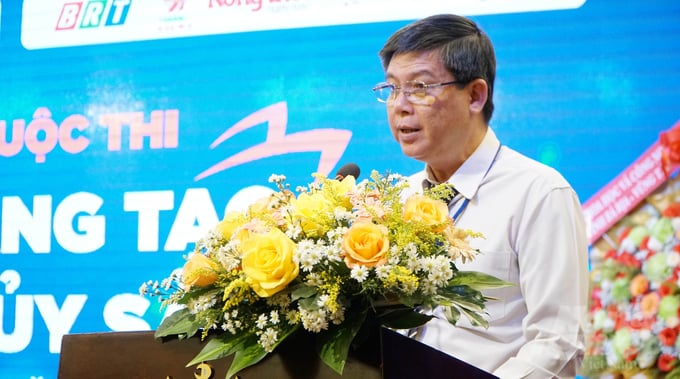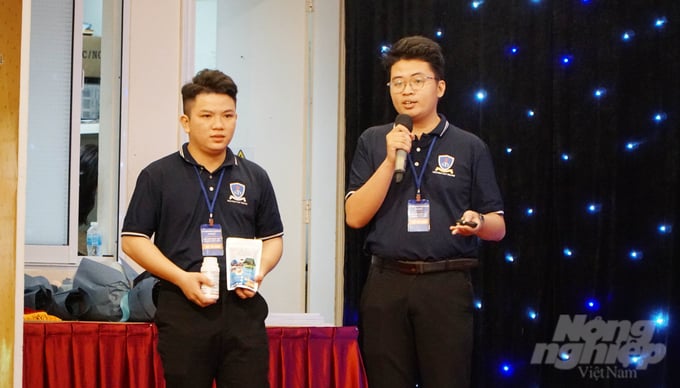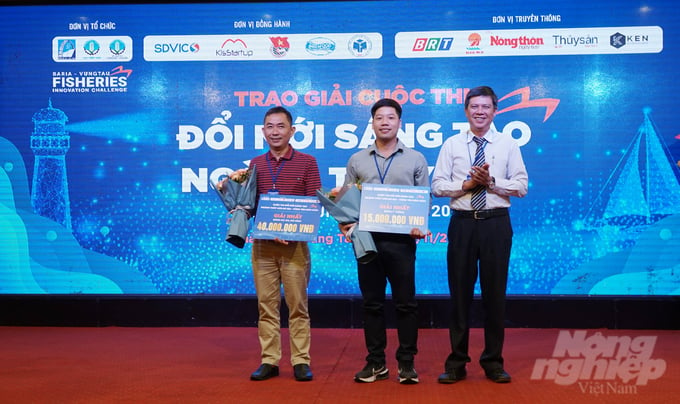May 30, 2025 | 13:29 GMT +7
May 30, 2025 | 13:29 GMT +7
Hotline: 0913.378.918
May 30, 2025 | 13:29 GMT +7
Hotline: 0913.378.918

Mr. Tran Duy Tam Thanh, Deputy Director of the Department of Science and Technology of Ba Ria-Vung Tau. Photo: Le Binh.
This year's final round of the competition showcased 8 projects, solutions, and innovative ideas from various participating organizations. The competition covered several key areas, including digital transformation, green transition, information technology, processing and aquaculture feed.
Mr. Tran Duy Tam Thanh, the Deputy Director of the Department of Science and Technology of Ba Ria-Vung Tau, noted that these exemplary projects were carefully selected from a pool of 38 submissions. Each of these projects and ideas possesses practical value and is ready for immediate application in production and management processes.
The competition was first launched by the Department of Science and Technology in 2020, with the aim of identifying and developing technological solutions and innovation that enhance the value of the seafood industry while addressing various challenges faced by the sector in the province.
“From this initiative, we aspire to cultivate an innovation and startup ecosystem within the seafood sector at the provincial level, as well as across the entire nation. This goal is particularly crucial in the context of the 4.0 era, where enhancing the application of scientific and technological advancements in production processes is essential", Mr. Tam Thanh emphasized.
Since the competition began five years ago, a remarkable total of 160 projects, solutions, and ideas have been submitted. Many of these projects have received from valuable expert feedback, allowing for significant refinement and development. This collaborative effort has led to more efficient practices in the exploitation and cultivation of seafood, resulting in cost savings and improved yields.

The project on the application of black soldier flies in the raw materials for aquaculture feed, developed by two students from Nguyen Tat Thanh University, won third prize in the project and model competition. Photo: Le Binh.
According to Mr. Tran Thai Son, Director of Viet Development Cooperation LLC and Deputy Head of the Competition Organizing Committee, the products that reached the final round this year possess very high practical application value.
"Among these, notable projects include the "Fishing vessel management system to support fishermen at sea and combat illegal, unreported, and unregulated (IUU) fishing; technical solutions for shrimp farming developed by Wesolife, and projects that convert plastic waste into ultra-lightweight and durable construction materials. If these projects are further refined, they will unlock many bottlenecks for the seafood industry specifically", Mr. Son assessed.

The two projects that won the overall first prize are both technical solutions for shrimp farming. Photo: Le Binh.
Ultimately, two projects from Wesolife Company, based in Ca Mau Province, were awarded first prize at the 2024 Innovative Solutions in the seafood industry competition held in Ba Ria-Vung Tau.
In addition, the organizing committee distributed a total of 8 awards across two categories of the competition - projects and ideas. These included 2 first prizes, 2 second prizes, 2 third prizes, and 2 encouragement prizes, with the overall prize pool amounting to approximately 5.000 USD.
Furthermore, KisStartup Corporation contributed by offering 3 awards, each consisting of a three-month training support package for incubation. This initiative is part of the Marine Economy Innovation Startup Incubation Program (IMEP), with each package valued at 3.000 USD.
Translated by Phuong Linh
/2025/05/25/4127-3-073637_820.jpg)
(VAN) Thanks to the promotion from an FAO-implemented project, vegetable production in greenhouses in Moc Chau has seen strong development, from 1.5 hectares in 2021 to nearly 50 hectares in 2024.

(VAN) FAO has recently supported USD 140,000 to implement the project 'Risk mitigation human-animal interface risks through disease control initiatives in pig farming.'

(VAN) The People's Committee of Tra Vinh province has approved an adjustment to the investment policy for the Green Hydrogen Plant project, increasing its area to approximately 52.76 hectares.
![Reducing emissions from rice fields: [2] Farmers’ commitment to the soil](https://t.ex-cdn.com/nongnghiepmoitruong.vn/608w/files/news/2025/05/05/dsc08881jpg-nongnghiep-140632.jpg)
(VAN) Clean rice cultivation model in Thuong Tan commune, Bac Tan Uyen district, is assisting local residents in achieving sustainable agriculture by substantially reducing costs, increasing productivity, and protecting the environment.

(VAN) At the conference to disseminate Resolution No. 68, AgriS introduced its digital agricultural ecosystem and reaffirmed its commitment to accompanying the Government in promoting private sector development and sustainable agriculture.

(VAN) 'Blue Ocean - Blue Foods' initiative is designed to restore marine ecosystems and establish sustainable livelihoods for local communities by cultivating a minimum of 1,000 hectares of cottonii seaweed in the first three years.
/2025/05/21/4642-3-112707_603.jpg)
(VAN) The V-SCOPE project has made direct contributions to three out of six pillars of the Comprehensive Strategic Partnership between Vietnam and Australia.